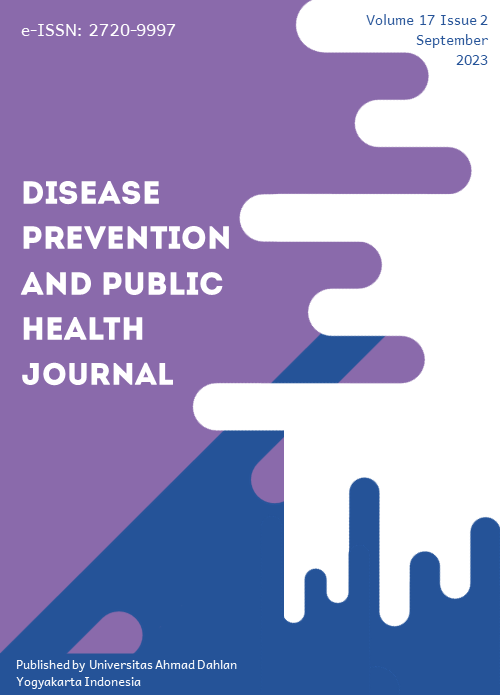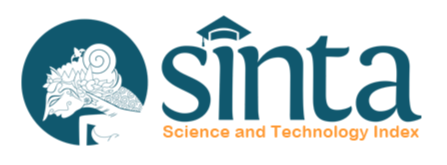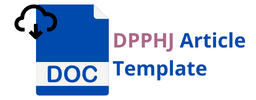Knowledge, Attitudes, and Practices Related to Covid-19 in College Students
DOI:
https://doi.org/10.12928/dpphj.v17i2.7843Keywords:
Knowledge , Attitude, Practice, Student , Covid-19Abstract
Background: The world is currently dealing with a new outbreak which is called Covid-19. As a consequence, understanding how students react to a public health emergency is crucial for a school or university. This study is aimed to learn about students' Covid-19 knowledge, attitudes, and practices. The goal of this study is to discover what students know about Covid-19, as well as their views and practices about it. Methods: This research was conducted at a private institution in Surakarta, Indonesia, using a cross-sectional survey with students as the participants adopting purposive sampling. The survey includes a questionnaire on Covid-19 Knowledge, Attitudes, and Practice (KAP) that students voluntarily complete. Result: A total of 476 people were involved in the study comprising 185 males and 291 females ranging in age from 17 to 26. It is found that medical female students had significantly higher knowledge, with p<0.001 and p = 0.023. Based on the overall KAP score, medical female students had better knowledge and a positive attitude (p 0.004). The total score for Knowledge, Attitude, and Practice was 18.95 ± 2,188 with knowledge scores of 3.80 ± 0.848 (range: 0 ~ 5), attitudes of 6.48 ± 1,425 (range: 0 ~ 10), and practice of 8.67± 1.133 (range: 0 ~ 10) respectively. Conclusion: The majority of students have a good understanding of Covid-19 and practice it regularly. However, the overall value of knowledge, attitudes, and practices varies significantly between gender, department, and level.
References
WHO. Archived: WHO timeline-COVID- 19. 2020. doi: https://doi.org/10.46945/bpj.10.1.03.01
Bartoletti M, Azap O, Barac A, Bussini L, Ergonul O, Krause R, Paño-Pardo JR, Power NR, Sibani M, Szabo BG, Tsiodras S, Verweij PE, Zollner-Schwetz I, Rodríguez-Baño J. ESCMID COVID-19 living guidelines: drug treatment and clinical management. Clin Microbiol Infect. 2022 Feb;28(2):222-238. doi: 10.1016/j.cmi.2021.11.007. Epub 2021 Nov 22. PMID: 34823008; PMCID: PMC8606314.
Hasöksüz M, Kiliç S, Saraç F. Coronaviruses and SARS-COV-2. Turk J Med Sci. 2020 Apr 21;50(SI-1):549-556. doi: 10.3906/sag-2004-127. PMID: 32293832; PMCID: PMC7195990.
Djalante R, Lassa J, Setiamarga D, et al. Review and analysis of current responses to COVID-19 in Indonesia: period of January to March 2020. Prog Disaster Sci. 2020;6:100091. doi: https://doi.org/10.37301/elect.v1i2.61
Kim HJ, Ko JS, Seo H, Kim TY. Guidelines for the control and prevention of coronavirus disease (COVID-19) transmission in surgical and anesthetic settings. Korean J Anesthesiol. 2020 Aug;73(4):271-274. doi: 10.4097/kja.20235. Epub 2020 May 12. PMID: 32392669; PMCID: PMC7403121.
Firth J. Covid-19 current advice for pathologists. Pathologica. 2020 Jun;112(2):55-56. doi: 10.32074/1591-951X-12-20. Epub 2020 Mar 17. PMID: 32292181; PMCID: PMC7931567.
Ciance KL. Protect Yourself From Peril. Nurs Womens Health. 2020 Feb;24(1):63-64. doi: 10.1016/j.nwh.2019.11.001. Epub 2019 Dec 28. PMID: 31887258.
Wibawa T. COVID-19 vaccine research and development: ethical issues. Trop Med Int Health. 2021 Jan;26(1):14-19. doi: 10.1111/tmi.13503. Epub 2020 Oct 19. PMID: 33012020; PMCID: PMC7675299.
Ajilore K, Atakiti I, Onyenankeya K. Huda F, Kumar P, Singh SK, Agrawal S, Basu S. Covid-19 and surgery: Challenging issues in the face of new normal - A narrative review. Ann Med Surg (Lond). 2020 Dec;60:162-167. doi: 10.1016/j.amsu.2020.10.039. Epub 2020 Oct 23. PMID: 33133594; PMCID: PMC7583620.
Nwagbara UI, Osual EC, Chireshe R, Bolarinwa OA, Saeed BQ, Khuzwayo N, Hlongwana KW. Knowledge, attitude, perception, and preventative practices towards COVID-19 in sub-Saharan Africa: A scoping review. PLoS One. 2021 Apr 19;16(4):e0249853. doi: 10.1371/journal.pone.0249853.
Saka Laksmita A, Putu Risky Vidika Apriyanthi D, Putu Widayanti N. Community Knowledge, Attitudes and Behaviors towards Obesity Prone to COVID-19 Infection. Disease Prevention and Public Health Journal [Internet]. 2023 Feb 12;17(1):76–81. Available from: http://dx.doi.org/10.12928/dpphj.v17i1.6968
Zhang M, Zhou M, Tang F, Wang Y, Nie H, Zhang L et al. Knowledge, attitude, and practice regarding COVID-19 among healthcare workers in Henan, China. J Hosp Infect. 2020; 105:183-187. doi: https://doi.org/10.1016/j.jhin.2020.04.012. PMID: 32278701
Gao H, Hu R, Yin L, et al. Knowledge, attitudes and practices of the Chinese public with respect to coronavirus disease (COVID-19): an online cross-sectional survey. BMC Public Health 2020;20:1816. doi: https://doi.org/10.1186/s12889-020-09961-2
Yousaf MA, Noreen M, Saleem T, et al. A cross-sectional survey of knowledge, attitude, and practices (KAP) toward pandemic COVID-19 among the general population of Jammu and Kashmir, India. Soc Work Public Health 2020;35:569-78. doi: https://doi.org/10.1080/19371918.2020.1806983
Ferdous MZ, Islam MS, Sikder MT, et al. Knowledge, attitude, and practice regarding COVID-19 outbreak in Bangladesh: an onlinebased cross-sectional study. PLoS One 2020;15:e0239254. doi: https://doi.org/10.1371/journal.pone.0239254
Peng Y, Pei C, Zheng Y, Wang J, Zhang K, Zheng Z, et al. A cross-sectional survey of knowledge, attitude and practice associated with COVID-19 among undergraduate students in China. BMC Public Health. 2020 Aug 26; 20(1):1292. doi: https://doi.org/10.1186/s12889-020-09392-z.
Alrasheedy A Alian, Suhaj Abdulsalim, Maryam Farooqui, Saud Alsahali, Brian Godman. Knowledge, attitude and practice about coronavirus disease (covid-19) pandemic and its psychological impact on students and their studies: a cross-sectional study among pharmacy students in Saudi Arabia. Risk Management and Healthcare Policy 2021:14 729-741. doi: https://doi.org/10.26650/eor.20200049
Singh Jagajeet Prasad, Anshuman Sewda, Shiv Dutt Gupta. Assessing the knowledge, attitude and practices of students regarding the covid-19 pandemic. Journal of Health Management 22(2) 281-290, 2020. doi: https://doi.org/10.1177%2F0972063420935669
Z Gao, Songsong Ying, Jun Liu, Huiqiu Zhang, Jinxin Li, Changling Ma. A cross-sectional study: Comparing the attitude and knowledge of medical and non-medical students toward 2019 novel coronavirus. Journal of Infection and Public Health 13 (2020) 1419-1423. doi: https://doi.org/10.1016/j.jiph.2020.06.031
Heung YY, Wong KY, Kwong WY, To SS, Wong HC. Daniel Wong. Severe acute respiratory syndrome outbreak promotes a strong sense of professional identity among nursing students. Nurse Educ Today. 2005;25(2): 112-8. doi: https://doi.org/10.1016/j.nedt.2004.11.003
Muslih, M.; Susanti, H.D.; Rias, Y.A.; Chung, M.-H. Knowledge, Attitude, and Practice of Indonesian Residents toward COVID-19: A Cross-Sectional Survey. Int. J. Environ. Res. Public Health 2021, 18, 4473. doi: https://doi.org/10.3390/ijerph18094473
Sari, D.K.; Amelia, R.; Dharmajaya, R.; Sari, L.M.; Fitri, N.K. Positive Correlation Between General Public Knowledge and Attitudes Regarding COVID-19 Outbreak 1 Month After First Cases Reported in Indonesia. J. Community Health 2021, 46, 182-189. doi: https://doi.org/10.1007/s10900-020-00866-0
Tamang Nira, Punam Rai, Siddhartha Dhungana, Binod Sherchan, Bikash Shah, Prajjwal Pyakurel, Saroj Rai. COVID-19: a National Survey on perceived level of knowledge, attitude and practice among frontline healthcare Workers in Nepal. BMC Public Health (2020) 20:1905. doi: https://doi.org/10.1186/s12889-020-10025-8
Baniyas N, Sheek-Hussein M, Al Kaabi N, Al Shamsi M, Al Neyadi M, Al Khoori R, et al. (2021) COVID-19 knowledge, attitudes, and practices of United Arab Emirates medical and health sciences students: A cross sectional study. PLoS ONE 16(5): e0246226. doi: https://doi.org/10.1371/journal.pone.0246226
Hasan H, Raigangar V, Osaili T, Neinavaei NE, Olaimat AN, Aolymat I. A Cross-Sectional Study on University Students' Knowledge, Attitudes, and Practices Toward COVID-19 in the United Arab Emirates. Am J Trop Med Hyg. 2021; 104:75-84. doi: https://doi.org/10.4269/ajtmh.20-0857.
Hatabu A, Mao X, Zhou Y, Kawashita N, Wen Z, Ueda M, et al. Knowledge, attitudes, and practices toward COVID-19 among university students in Japan and associated factors: An online cross-sectional survey. PLoS One. 2020; 15:e0244350. doi: https://doi.org/10.1371/journal.pone.0244350.
Noreen K, Rubab ZE, Umar M, Rehman R, Baig M, Baig F. Knowledge, attitudes, an practices against the growing threat of COVID-19 among medical students of Pakistan. PLoS One. 2020 Dec 11;15(12):e0243696. doi: https://doi.org/10.1371/journal.pone.0243696
Khasawneh AI, Humeidan AA, Alsulaiman JW, Bloukh S, Ramadan M, Al-Shatanawi TN, et al. Medical Students and COVID-19: Knowledge, Attitudes, and Precautionary Measures. A Descriptive Study From Jordan. Front Public Health. 2020; 8:253. doi: https://doi.org/10.3389/fpubh.2020.00253
Jairoun A, Hassan N, Ali A, Jairoun O, Shahwan M. Knowledge, attitude and practice of antibiotic use among university students: a cross sectional study in UAE. BMC Public Health. 2019; 19:518. doi: https://doi.org/10.1186/s12889-019-6878-y. Available from https://bmcpublichealth.biomedcentral.com/articles/10.1186/s12889-019-6878-y. PMID: 31060543
Wati N, Oktarianita O, Sartika A. Community Personal Hygiene Knowledge and Attitude to Covid-19 Prevention Behavior. Disease Prevention and Public Health Journal [Internet]. 2023 Mar 7;17(1):116–23. Available from: http://dx.doi.org/10.12928/dpphj.v17i1.7098
Sulistyawati Sulistyawati, Rokhmayanti Rokhmayanti, Budi Aji, Siwi Pramatama Mars Wijayanti, Siti Kurnia Widi Hastuti, Tri Wahyuni Sukesi, Surahma Asti Mulasari. Knowledge, attitudes, practices and information needs during the covid-19 pandemic in Indonesia. Risk Management and Healthcare Policy 2021:14 163-175. doi: https://dx.doi.org/10.2147%2FRMHP.S28857
Downloads
Published
Issue
Section
License
Copyright (c) 2023 Universitas Ahmad Dahlan

This work is licensed under a Creative Commons Attribution-ShareAlike 4.0 International License.
Authors transfer the copyright and grant the Disease Prevention and Public Health Journal right of first publication with the work simultaneously licensed under a Creative Commons Attribution License (CC BY-SA 4.0) that allows others to share (copy and redistribute the material in any medium or format) and adapt (remix, transform, and build upon the material) the work for any purpose, even commercially with an acknowledgement of the work's authorship and initial publication in Disease Prevention and Public Health Journal. Authors are able to enter into separate, additional contractual arrangements for the non-exclusive distribution of the journal's published version of the work (e.g., post it to an institutional repository or publish it in a book), with an acknowledgement of its initial publication in Disease Prevention and Public Health Journal. Authors are permitted and encouraged to post their work online (e.g., in institutional repositories or on their website) prior to and during the submission process, as it can lead to productive exchanges, as well as earlier and greater citation of published work (See The Effect of Open Access).

This work is licensed under a Creative Commons Attribution-ShareAlike 4.0 International License.







